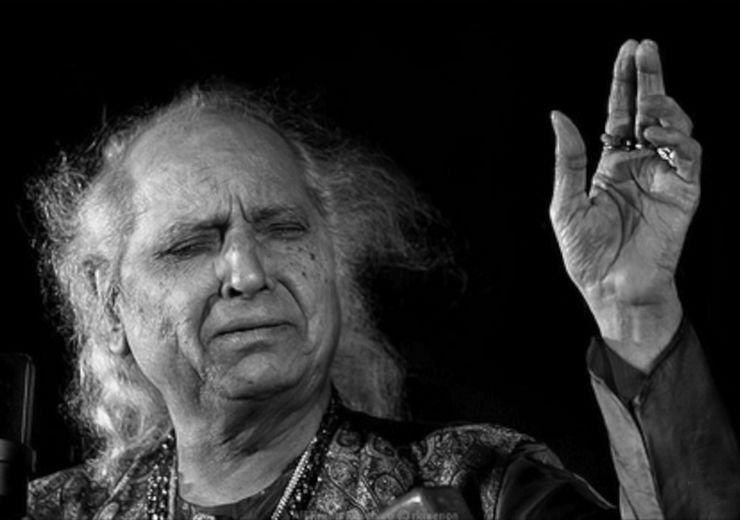Pandit Jasraj: The Indian Classical Music Maestro

Indian classical music legend, Pandit Jasraj, passed away in the US on Monday, August 17, following a cardiac arrest. He was 90.
Jasraj, a vocalist known for his distinctive rich voice, belonged to the Mewati style or gharana. He was noted for infusing the customary bandishes with elements of other gharanas. His ability and tendency to improvise at every recital drew crowds until the very end.
Of the several awards he has won in a career spanning 80 years, are the Padma Shri, Padma Bhushan and Padma Vibhushan.
He is survived by his wife Madhura Shantaram and his children, Shaarang Dev Pandit and Durga Jasraj.
Born on 28 January 1930, Pandit Jasraj gave a new height to Indian classical music. Pandit Jasraj played an important role in giving Indian classical music an important place in the world music. Pandit Jasraj was born in a family of outstanding musicians over four generations, Pandit Jasraj was initiated into music by his revered father, Pandit Motiram, until the age of three, when his father passed away. Thereafter he underwent intensive tutelage under his elder brother and Guru, Pandit Maniram. Later, along his turbulent path of hard-earned maturity, he was guided by his spiritual Guru Maharaja Jaiwant Singh.
Blessed with a voice which traverses masterfully over all four and a half octaves, Jasraj’s vocalizing is characterized by a harmonious blend of the classic and opulent elements projecting traditional music as an intense spiritual expression, at once chaste and yet densely coloured. This gives his music a unique and sublime emotional quality, reaching out to the very soul of the listener. Perfect diction, clarity in sur (musical notes), and gayaki (creative musical progression), command in all aspects of laya and rhythm, depth of composition and an unmistakable interplay between notes and words to evoke the desired mood and emotion, are the hallmark of Panditji’s music. This sensitivity, added to the pure classical approach, has given his singing a lyrical quality, the quintessential of the Mewati tradition of singing.
The Mewati Gharana is a musical clan and style formed in the late 19th century by Ustad Ghagge Nazir Khan Saheb of Jodhpur. Ustad Ghagge Nazir Khan taught his music to his foremost disciples – Pandit Natthulal and Pandit Chimanlal (who died young). Natthulal passed this knowledge onto his nephew Pandit Motiram who shared his learning with his brother, Pandit Jyotiram. At the turn of the 20th century, the Mewati Gharana was under the musical patronage of royalty.
Unfortunately, his music came to an untimely end when he passed away on the day, he was to be appointed Court Musician under the patronage of Osman Ali Khan- the last Nizam of Hyderabad. Pandit Motiram, who was Pandit Jasraj’s father, had already initiated him into the world of Hindustani Classical music.
When he died, Jasraj was four. Following his father’s demise, his two elder brothers, Pandit Maniram and Pandit Pratap Narayan, undertook Jasraj’s musical tutelage. The brothers were taught the fine art of Mewati Gayaki by Motiram’s younger brother, Pandit Jyotiram was highly influenced by Ustad Rajab Ali Khan.
The musical style of the Mewati gharana can be best described as including spiritual and devotional overtones. Attention is lavished on the aalaap as this is where the foundation of the raag is built, but not before the invocation of the Lord with the phrase, “Om Shri Ananta Hari Narayan”.
From its humble beginnings, the Mewati Gharana is now one of the most easily recognizable styles of Hindustani Classical Music. Of course, a major part of this is due to the efforts, talent and devotion of Pandit Jasraj.
Minor Planet Named After Him:
Minor planets are comparatively smaller bodies than planets and they revolve around the Sun but are not exactly spherical in shape. Such planets are thoroughly studied by astronomers before being named. Generally, in the case of small Solar System bodies, the discoverers enjoy the privilege of suggesting a name for them, but significant bodies have to undergo a thorough analysis by the experts.
A minor planet located between Mars and Jupiter, has been named after Pandit Jasraj, the doyen of Hindustani classical music.
International Astronomical Union (IAU) has named the minor planet 2006 VP32 (number-300128 - which is Pandit Jasraj’s date of birth in reverse order). It was discovered on November 11, 2006 and been named Panditjasraj. This planet traverses the cosmos between the orbits of Mars and Jupiter in the solar system.
After being felicitated with this honour, Padma Vibhushan awardee Pandit Jasraj has become the first Indian musician to join immortal composers like Mozart, Beethoven and Tenor Luciano Pavarotti in the galaxy.
Innovations and Contributions
Along with Vidushi Kishori Amonkar, from the early 1970s, Jasraj spearheaded what came to be known as the ‘romanticist movement’ in Hindustani music. According to musicologist Deepak Raja, Jasraj “imparted a lyrical quality to (this) elaborate raga exposition through opulent ornamentation of phrasing, thus making his music explicitly communicative of emotional values.” A deeper scholarly analysis of this movement within the ambit of Hindustani music needs to be carried out to adequately situate the contribution of Jasraj.
Apart from canonical rendition of several ragas such as Gurjri Todi, Basant, Bhimpalasi, Miyan ki Malhar, Poorvi, Bihag and Darbari Kanhra, Jasraj immortalized himself through his intense exploration of the bhakti repertoire. His concerts would hardly be considered complete without one among “Govind Damodar Madhaveti”, “Shri Madhurashtakam”, “Shivashtakam”, “Om Namo Bhagwate Vasudevaya”, “Mata Kalika”, “Kasturi Tilakam” “Vraje Vasantam” and other devotional offerings. The way in which he was able to unravel a new dimension of the sub-genre of bhajan within the ambit of classical music made him a force to reckon with and placed him along with luminaries such as D.V. Paluskar and Kumar Gandharva.
In the rendition of a raga in Hindustani classical music, the lyrics of the composition are often thought to primarily serve as a springboard for creative musical ideas and very few vocalists are able to judiciously balance the attention paid to sangeet and sahitya during performance.
He talked about this unique aspect of his musicianship often and credited his father-in-law, the movie director V. Shantaram, for making him cognizant of this aspect. In an interview, Jasraj said, “The most important tip he gave me was his remark ‘You sing lovely compositions with the choicest of words but take care about the clarity of those words so that they reach your listeners with the desired impact.”
Jasraj created a unique kind of jugalbandi called Jasrangi, based on the notion of moorchhana in which a male and female vocalist perform different ragas alongside to deliver a unique experience of harmony to the listener. Through the course of his professional career, he tutored several students who have themselves become established artists over the years. Some of his well-known disciples include Sanjeev Abhayankar, Kala Ramnath, Tripti Mukherjee, Rattan Mohan Sharma, Anuradha Paudwal and Sadhana Sargam.
Pandit Jasraj has not only created over a three hundred bandishes (compositions) himself but has also traversed the uncharted path of singing ancient Sanskrit verses of great saint-poets in pure Indian classical style. This has helped create a major spiritual revolution in classical music. He sings these Sanskrit compositions to rapt audiences with divine inspiration.
Honours:
It’s not even surprising to know the innumerable honours he has been bestowed with;
In 1975, he received Padma Shri, fourth highest civilian award in India.
In 1987, Sangeet Natak Akademi Award, highest Indian recognition to the practising artists.
In 1990, he received Padma Bhushan, third-highest civilian award in India.
In 2000, he was conferred Padma Vibhushan, second highest civilian award in India.
In 2008, he received Swathi Sangeetha Puraskaram, the highest honour for musicians given by Kerala State Government.
In 2010, he was awarded Sangeet Natak Akademi Fellowship, officially known as Sangeet Natak Akademi Ratna Sadasya, is an Indian honour for the performing arts presented by Sangeet Natak Akademi. It is "the most prestigious and rare honour" conferred by the Akademi and is restricted to 40 individuals at any given time.
In 2012, he received the Pu La Deshpande lifetime achievement award. P.L. Deshpande was a Marathi writer and a humorist from Maharashtra.
In 2014, he received Sumitra Charat Ram Award for Lifetime Achievement. Sumitra Charat Ram was a noted Indian arts patron.
In 2014, he received the Marwar Sangeet Ratna Award. The Sangeet Ratna Award is given by Government of Uttar Pradesh in the memory of Ustad Bismillah Khan.
In the year 2016, he was awarded Gangubai Hangal Lifetime Achievement Award instituted by Gangubai Hangal Sangeet Mahotsav Samiti.
He was conferred Sangeet Kala Ratna, earlier known as Hamsa Award by the Government of Andhra Pradesh.
His renditions of Jai Hind, Tiranga take him beyond just music and into the realm of nationalistic pride and his rendition for the cause of AIDS for the BBC and Panchatatva (musical awareness towards global warming) are milestones in themselves…
He is also the Founder Patron of the Indian Music Academy, an organization formed primarily to achieve the objective of:
- Popularizing all genres of Indian Music around the globe
- Promoting extraordinary young talents of all forms of music
- Providing medical aid to needy musicians, lyricists and their dependants.
These are unprecedented initiatives in the history of Indian music that have immortalized his name during his lifetime.
Pandit Jasraj’s persona spreads much beyond, as a constantly expanding creative genius, a revered guru, and above all one of India’s most active cultural ambassador to the world.
As he sings, geographical borders get erased; religious barriers melt away, racial colours mix freely on the palette of humanity and he shines as Sangeet Martand, the blazing sun of music.
As a mentor and guru, Pandit Jasraj has already presented to the world an impressive number of illustrious disciples whom he has nurtured and trained in accordance with India’s rich tradition of the Guru-Shisya Parampara, the ideal teacher-student relationship. Today, his frontrunner disciples too are elevating the platform of Indian music to every corner of the world.
Pandit Jasraj and his music shall remain immortal for many decades to follow. May his soul rest in peace!















































